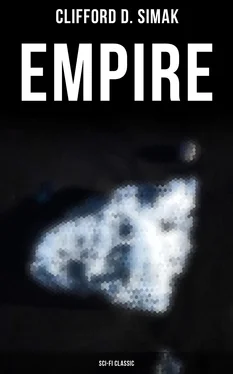Clifford D. Simak - Empire (Sci-Fi Classic)
Здесь есть возможность читать онлайн «Clifford D. Simak - Empire (Sci-Fi Classic)» — ознакомительный отрывок электронной книги совершенно бесплатно, а после прочтения отрывка купить полную версию. В некоторых случаях можно слушать аудио, скачать через торрент в формате fb2 и присутствует краткое содержание. Жанр: unrecognised, на английском языке. Описание произведения, (предисловие) а так же отзывы посетителей доступны на портале библиотеки ЛибКат.
- Название:Empire (Sci-Fi Classic)
- Автор:
- Жанр:
- Год:неизвестен
- ISBN:нет данных
- Рейтинг книги:4 / 5. Голосов: 1
-
Избранное:Добавить в избранное
- Отзывы:
-
Ваша оценка:
- 80
- 1
- 2
- 3
- 4
- 5
Empire (Sci-Fi Classic): краткое содержание, описание и аннотация
Предлагаем к чтению аннотацию, описание, краткое содержание или предисловие (зависит от того, что написал сам автор книги «Empire (Sci-Fi Classic)»). Если вы не нашли необходимую информацию о книге — напишите в комментариях, мы постараемся отыскать её.
Empire (Sci-Fi Classic) — читать онлайн ознакомительный отрывок
Ниже представлен текст книги, разбитый по страницам. Система сохранения места последней прочитанной страницы, позволяет с удобством читать онлайн бесплатно книгу «Empire (Sci-Fi Classic)», без необходимости каждый раз заново искать на чём Вы остановились. Поставьте закладку, и сможете в любой момент перейти на страницу, на которой закончили чтение.
Интервал:
Закладка:
"Thank you, come again," the cashier-robot fluted.
"Don't mention it," growled Wilson.
Outside the restaurant he walked briskly. Ten blocks away he came to a building roofing four square blocks. Over the massive doorway, set into the beryllium steel, was a map of the Solar System, a map that served as a cosmic clock, tracing the movement of the planets as they swung in their long arcs around the Sun. The Solar System was straddled by glowing, golden letters. They read: Interplanetary Building.
It was from here that Spencer Chambers ruled his empire built on power.
Wilson went inside.
CHAPTER IV
Table of Contents
The new apparatus was set up, a machine that almost filled the laboratory ... a giant, compact mass of heavy, solidly built metal work, tied together by beams of girderlike construction. It was meant to stand up under the hammering of unimaginable power, the stress of unknown spatial factors.
Slowly, carefully, Russell Page tapped keys on the control board, setting up an equation. Sucking thoughtfully at his pipe, he checked and rechecked them.
Harry Wilson regarded him through squinted eyes.
"What the hell is going to happen now?" he asked.
"We'll have to wait and see," Russ answered. "We know what we want to happen, what we hope will happen, but we never can be sure. We are working with conditions that are entirely new."
Sitting beside a table littered with papers, staring at the gigantic machine before him, Gregory Manning said slowly: "That thing simply has to adapt itself to spaceship drive. There's everything there that's needed for space propulsion. Unlimited power from a minimum of fuel. Split-second efficiency. Entire independence of any set condition, because the stuff creates its own conditions."
He slowly wagged his head.
"The secret is some place along the line," he declared. "I feel that we must be getting close to it."
Russ walked from the control board to the table, picked up a sheaf of papers and leafed through them. He selected a handful and shook them in his fist.
"I thought I had it here," he said. "My math must have been wrong, some factor that I didn't include in the equation."
"You'll keep finding factors for some time yet," Greg prophesied.
"Repulsion would have been the answer," said Russ bitterly. "And the Lord knows we have it. Plenty of it."
"Too much," observed Wilson, smoke drooling from his nostrils.
"Not too much," corrected Greg. "Inefficient control. You jump at conclusions, Wilson."
"The math didn't show that progressive action," said Russ. "It showed repulsion, negative gravity that could be built up until it would shoot the ship outside the Solar System within an hour's time. Faster than light. We don't know how many times faster."
"Forget it," advised Greg. "The way it stands, it's useless. You get repulsion by progressive steps. A series of squares with one constant factor. It wouldn't be any good for space travel. Imagine trying to use it on a spaceship. You'd start with a terrific jolt. The acceleration would fade and just when you were recovering from the first jolt, you'd get a second one and that second one would iron you out. A spaceship couldn't take it, let alone a human body."
"Maybe this will do it," said Wilson hopefully.
"Maybe," agreed Russ. "Anyhow we'll try it. Equation 578."
"It might do the trick," said Greg. "It's a new approach to the gravity angle. The equation explains the shifting of gravitational lines, the changing and contortion of their direction. Twist gravity and you have a perfect space drive. As good as negative gravity. Better, perhaps, more easily controlled. Would make for more delicate, precise handling."
Russ laid down the sheaf of papers, lit his pipe and walked to the apparatus.
"Here goes," he said.
His hand went out to the power lever, eased it in. With a roar the material energy engine built within the apparatus surged into action, sending a flow of power through the massive leads. The thunder mounted in the room. The laboratory seemed to shudder with the impact.
Wilson, watching intently, cried out, a brief, choked-off cry. A wave of dizziness engulfed him. The walls seemed to be falling in. The room and the machine were blurring. Russ, at the controls, seemed horribly disjointed. Manning was a caricature of a man, a weird, strange figure that moved and gestured in the mad room.
Wilson fought against the dizziness. He tried to take a step and the floor seemed to leap up and meet his outstretched foot, throwing him off balance. His cigarette fell out of his mouth, rolled along the floor.
Russ was shouting something, but the words were distorted, loud one instant, rising over the din of the apparatus, a mere whisper the next. They made no sense.
There was a peculiar whistling in the air, a sound such as he had never heard before. It seemed to come from far away, a high, thin shriek that was torture in one's ears.
Giddy, seized with deathly nausea, Wilson clawed his way across the floor, swung open the laboratory door and stumbled outdoors. He weaved across the lawn and clung to a sun dial, panting.
He looked back at the laboratory and gasped in disbelief. All the trees were bent toward the building, as if held by some mighty wind. Their branches straining, every single leaf standing at rigid attention, the trees were bending in toward the structure. But there was no wind.
And then he noticed something else. No matter where the trees stood, no matter in what direction from the laboratory, they all bent inward toward the building ... and the whining, thundering, shrieking machine.
Inside the laboratory an empty bottle crashed off a table and smashed into a thousand fragments. The tinkling of the broken glass was a silvery, momentary sound that protested against the blasting thrum of power that shook the walls.
Manning fought along the floor to Russ's side. Russ roared in his ear: "Gravitational control! Concentration of gravitational lines!"
The papers on the desk started to slide, slithering onto the floor, danced a crazy dervish across the room. Liquids in the laboratory bottles were climbing the sides of glass, instead of lying at rest parallel with the floor. A chair skated, bucking and tipping crazily, toward the door.
Russ jerked the power lever back to zero. The power hum died. The liquids slid back to their natural level, the chair tipped over and lay still, papers fluttered gently downward.
The two men looked at one another across the few feet of floor space between them. Russ wiped beads of perspiration from his forehead with his shirt sleeve. He sucked on his pipe, but it was dead.
"Greg," Russ said jubilantly, "we have something better than anti-gravity! We have something you might call positive gravity ... gravity that we can control. Your grandfather nullified gravity. We've gone him one better."
Greg gestured toward the machine. "You created an attraction center. What else?"
"But the center itself is not actually an attracting force. The fourth dimension is mixed up in this. We have a sort of fourth-dimensional lens that concentrates the lines of any gravitational force. Concentration in the fourth dimension turns the force loose in three dimensions, but we can take care of that by using mirrors of our anti-entropy. We can arrange it so that it turns the force loose in only one dimension."
Greg was thoughtful for a moment. "We can guide a ship by a series of lenses," he declared at last. "But here's the really important thing. That field concentrates the forces of gravity already present. Those forces exist throughout all of space. There are gravitational lines everywhere. We can concentrate them in any direction we want to. In reality, we fall toward the body which originally caused the force of gravitation, not to the concentration."
Читать дальшеИнтервал:
Закладка:
Похожие книги на «Empire (Sci-Fi Classic)»
Представляем Вашему вниманию похожие книги на «Empire (Sci-Fi Classic)» списком для выбора. Мы отобрали схожую по названию и смыслу литературу в надежде предоставить читателям больше вариантов отыскать новые, интересные, ещё непрочитанные произведения.
Обсуждение, отзывы о книге «Empire (Sci-Fi Classic)» и просто собственные мнения читателей. Оставьте ваши комментарии, напишите, что Вы думаете о произведении, его смысле или главных героях. Укажите что конкретно понравилось, а что нет, и почему Вы так считаете.











